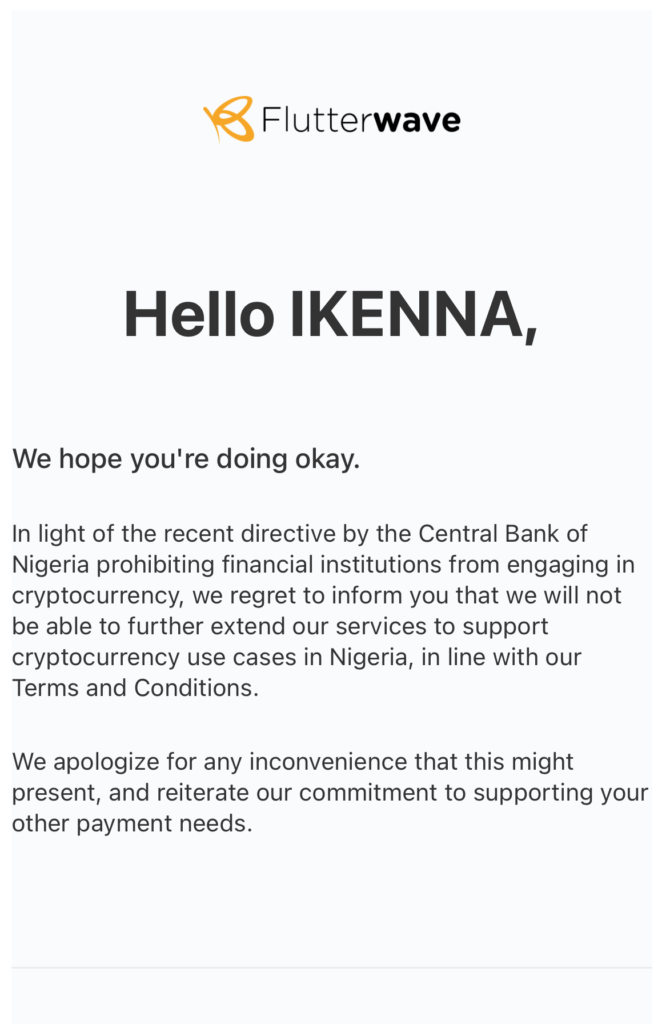In what has come as completely left field, the Central Bank of Nigeria (CBN) has asked banks and other financial institutions to close the accounts of cryptocurrency exchanges. Details of the new regulation are contained in a CBN circular (PDF) which is now making the rounds.
The new regulations mean that you will not be able to use a card from a Nigerian bank or any other financial institution in the country to process any transactions on a crypto exchange. In a nutshell, while virtual currencies remain legal, trading them through an exchange in Nigeria is near impossible.
The new rules also asks banks to identify “persons and or entities transacting in or operating cryptocurrency exchanges within their systems and ensure that such accounts are closed immediately.”
Source: Central Bank of Nigeria’s website
Cryptocurrency has become increasingly popular in Nigeria in the last few years. One factor which has driven its popularity is the CBN’s stringent rules around FX in what has been a failing effort to stabilise the Naira.

In December 2020, the Central Bank ordered switches and processors to stop all domestic currency transfers in respect of foreign remittances through International Money Transfer Operators (IMTOs). In the same month, Nigeria became the No. 2 bitcoin peer-to-peer market after the U.S with more than $566 million worth of bitcoin traded between 2015 and 2020.
Today’s circular means that while the CBN has not banned virtual currencies, it has effectively blocked the ability of the exchanges which trade them to collect payments from bank customers. Since crypto is hardly bought with cash from exchanges, this move will affect the operation of companies like BuyCoins, Patricia, Yellow Card among others.
While there have been conversations about the regulation of virtual currencies in Africa over the years, no one could have predicted these new rules.
Regulatory flip flops
The CBN has been indecisive about regulating crypto even as the asset class becomes more popular. To be sure, there are genuine concerns in the conversation about regulation, but in Africa, regulators have a penchant for banning what they don’t understand.
The Securities and Exchange Commission, whose primary function is to safeguard investors warned investors about trading virtual currency in 2017. In a turnaround, the SEC recognised the validity of cryptocurrency as investments in September 2020.
According to the SEC, “Virtual crypto assets are securities; unless proven otherwise. The burden of proving that the crypto assets proposed to be offered are not securities and therefore not under the jurisdiction of the SEC is placed on the issuer or sponsor of the said assets.”
The commission went further to say that, “issuers or sponsors of virtual digital assets shall be guided by the commission’s regulation. The general objective of regulation is not to hinder technology or stifle innovation, but to create standards that encourage ethical practices.”
Despite this, the CBN’s new rules have effectively stifled innovation and technology. A source at the SEC told TechCabal that he is not at liberty to comment on the CBN’s new rules until the commission holds a meeting.
Mum’s the word from cryptocurrency exchanges
At the moment, sources at one crypto exchange have told TechCabal that there will be no official response to the new regulation. It is not surprising, given that in Nigeria, the typical reaction when regulators pass downs stringent rules is to obey first and negotiate next.
For now, the key thing for these startups will be to move their funds from their banking partners in Nigeria and to start some quick thinking about the possibility of other markets. While the CBN has not spoken publicly about the regulation, it is too early to speculate on the possibility of a reversal.
Regardless, it is a big blow to crypto exchanges in Nigeria that have moved from niche offerings offering only trading to even launching stable coins. It may mark yet another watershed moment in the history of regulators going overboard in Nigeria.
What crypto regulation looks like across Africa
Away from Nigeria, the crypto regulation conversation has been ongoing in Africa for a while. In Algeria, the 2018 Financial Law prohibits the purchase, sale, use, and possession of virtual currency.
It is the same in Morocco and Libya. In South Africa, proposed regulations are aimed at protecting people from unscrupulous crypto traders.
“South Africans will be encouraged by ourselves to only deal with people that are registered with us when purchasing crypto assets. We will discourage – with warnings – why they should not use a crypto wallet based, for instance, in Cyprus.”
This is according to Brandon Topham, the Divisional Executive for Investigations and Enforcement at the regulatory Financial Sector Conduct Authority.
“Because we have got no control over them and we’ve got no assurance that they will honour what they say they’re going to do. Nothing will really change, because a South African that wants to open up a wallet using an offshore location will still be able to do it. It won’t be unlawful – just as it’s not unlawful at the moment – but they will definitely have no security that the players they are dealing with are of a reputable nature.”




















